“Ethics”
Written by Sara Charno & Stuart Charno and Ronald D. Moore
Directed by Chip Chalmers
Season 5, Episode 16
Production episode 40275-216
Original air date: March 2, 1992
Stardate: 45587.3
Captain’s Log: La Forge and Worf are trying to find the source of leakage in the cargo bay, and also discussing the previous night’s poker game. One of the containers collapses and falls right onto Worf’s back, shattering seven vertebrae and crushing his spinal cord. He’s paralyzed.
A neurospecialist named Dr. Toby Russell arrives on the Potemkin to consult on the case. She’s the best bet, since Klingon medicine is fairly primitive—the typical Klingon treatment for Worf’s injury is to let the patient die.
Worf asks Riker to help him perform the Hegh’bat ceremony—to help him die. When a warrior can no longer stand and defend himself, he is useless. He wishes to end his life with dignity and honor; Riker, though, isn’t at all comfortable with the notion of aiding a friend in committing suicide.
Russell’s been experimenting with a genitronic replicator that can grow replacement organs. She’s proposing to grow Worf a new spine. Crusher had no idea her research was this far along—and, it turns out, it isn’t. Russell hasn’t tested it on a live patient yet, and her holographic success rate is only thirty-seven percent. (“Even a holographic patient would balk at those odds.”) Crusher doesn’t think her research, or their knowledge of Klingon neurology, is far enough along to risk replacing Worf’s spine with a genitronically replicated one.
Their argument is interrupted by a distress call from the Denver, which got hit with a gravitic mine left over from the Cardassian war. There are over five hundred people on board, so Crusher immediately sets about turning the Enterprise into an emergency room.
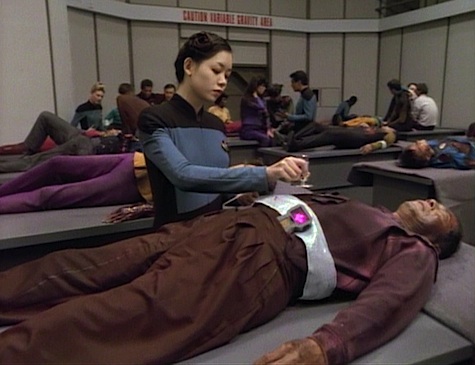
Meanwhile, Worf’s injury is causing problems for both Riker and Alexander. Riker talks to Picard about his unwillingness to help a friend commit suicide, cultural imperatives be damned—Picard makes a convincing argument for supporting one’s friend and cultural relativism—while Alexander is annoyed that Troi won’t let him see his father—which is at Worf’s own request, as he doesn’t wish Alexander to see him like that. Alexander speaks dismissively of “Klingon stuff,” indirectly quoting his mother K’Ehleyr on the subject.
After Troi gives Worf a hard time about his treatment of Alexander, Crusher and Russell arrive to discuss treatments. They can implant neural transducers that will eventually lead to getting him sixty to seventy percent of his mobility back. The first step are motor assist bands, but Worf’s look of disgust at the way they make his legs flail is palpable. Sixty percent of his mobility is not acceptable to him; he won’t be the object of derision, lurching through corridors like a half-Klingon machine.
Seeing that, Russell jumps in and dangles genitronics in front of Worf, causing Crusher to tear Russell a new one for giving him a straw to grasp at, and giving her a way to try her pet experiment. Russell’s been turned down three times by Starfleet Medical when she’s requested to test genitronics on live patients.
Troi brings Alexander to see Worf, who is using the motor assist bands to stand up so that Alexander won’t see how bad off Worf is. This fails, as he collapses, and Worf angrily demands that Alexander leave rather than see him so helpless.
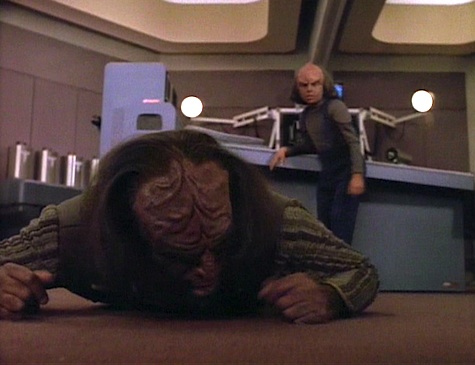
The Enterprise arrives at the Denver‘s crash site. Russell pitches in to help out with the injured. Russell tries an experimental treatment on one of the patients, and the patient dies. It’s possible the person would have died with conventional therapy, but she didn’t even try conventional therapy before going to her experimental one. Crusher angrily relieves her of all medical duties aboard the Enterprise.
Picard talks to Crusher and tries to get her to agree to the genitronic procedure. If she can’t restore Worf’s full mobility, he will kill himself. Crusher is not happy about that in the least, but in the end she reluctantly agrees.
Speaking of reluctantly agreeing, Riker enters Worf’s room with a ritual knife. He’s studied up on the Hegh’bat, and he hates it, hates the way it cloaks suicide in glory and honor. Riker’s also not going to make it easy on Worf, reminding him of comrades they’ve lost over the years, all of whom fought for life to the very end. Worf insists this isn’t easy for him, but Riker doesn’t buy it. He thinks Worf is taking the easy way out and not considering how his death would affect those around him who care about him.
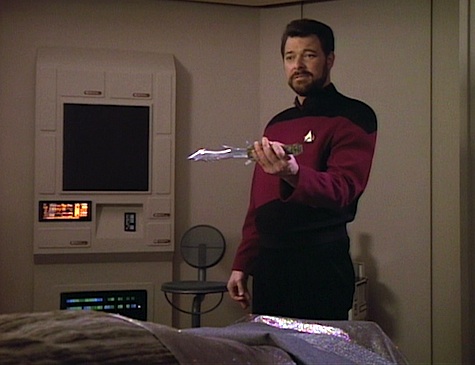
But despite all that, Riker would, if it were his place, do as Worf asks and participate in the ritual. But it isn’t his place—it’s Alexander’s place, as eldest son, to do what Worf’s asking Riker to do. Worf makes an excuse that Alexander is part human, but Riker thinks that Worf doesn’t want to put Alexander through that, which is trying to have it both ways.
Worf finally agrees to undergo the genitronic procedure and not perform the Hegh’bat. They remove his spine, then scan it for replication, which takes a little longer than anticipated. They put the new spine in, and Worf doesn’t reject it. They take him off life support—and then he starts to crash, going into cardiac arrest, with no brain activity. They try everything, but it doesn’t work, and Worf dies—for a bit, but then the brak’lul remembers that Worf is in the opening credits, so he miraculously recovers.
As Worf rehabs, even willing to let Alexander help him, Crusher once again tears into Russell—”You gambled, he won. Not all of your patients are that lucky.”
Can’t We Just Reverse the Polarity?: Klingon anatomy is, as Russell puts it, “overdesigned.” The average Klingon has twenty-three ribs, two livers, an eight-chambered heart, and a double-lined neural pia mater. Klingons refer to this and other biological redundancies as the brak’lul, and it also saves Worf’s life in the end.
Thank You, Counselor Obvious: Worf asks Troi to be the one to care for Alexander should he die under the knife. He respects her abilities and her counsel since Alexander came on board, and he can think of no one better to raise his son.
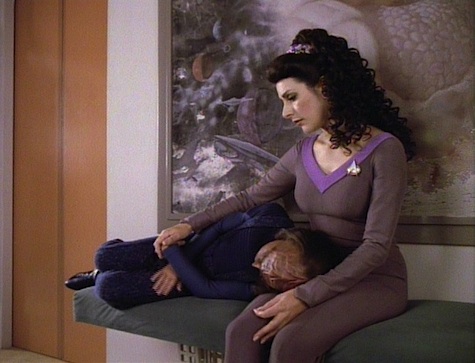
There is No Honor in Being Pummeled: Worf, as usual, dives right into Klingon tradition, initially believing suicide to be the only option. Picard sums it up best—the journey from Klingon tradition to the human belief that a paraplegic can live a fruitful life is too long a one for Worf to make. He also continues to be the worst parent ever, as pretty much every initial move he makes with Alexander is the wrong one.
No Sex, Please, We’re Starfleet: More of the seeds of the eventual Worf/Troi relationship are sown in this episode. Indeed, in more than one of the alternate timelines seen in the seventh season’s “Parallels,” the events of this episode lead to Worf and Troi marrying and having children of their own.
I Believe I Said That: “I’ve been studying Klingon ritual and Klingon law, and I’ve discovered that it’s not my place to fill that role. According to tradition, that honor falls to a family member—preferably the oldest son.”
“That is impossible! He is a child!”
“‘The son of a Klingon is a man the day he can first hold a blade.’ True?”
“Alexander is not fully Klingon! He is part-human!”
“That’s an excuse. What you really mean is that it would be too hard to look at your son and tell him to bring you the knife, watch you stab it into your heart, then pull the knife out of your chest and wipe your blood on his sleeve.”
Riker telling Worf to go screw himself.
Welcome Aboard: Caroline Kava’s the only real guest, as Russell. The other guests are regulars Brian Bonsall (Alexander) and Patti Yasutake (Nurse Ogawa).
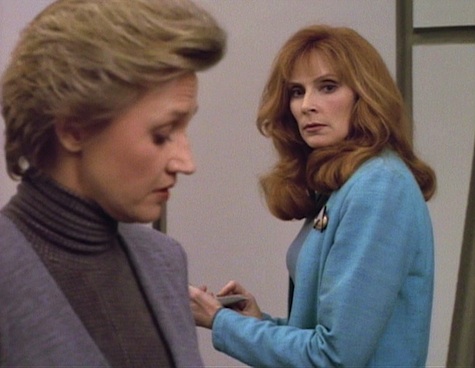
Trivial matters: This episode establishes that Klingon ridges also occur on the spine and feet.
As established in your humble rewatcher’s A Time for War, a Time for Peace, Crusher and Russell will continue to butt heads in the medical community over the next decade-plus, and Russell in that novel is placed on an inspection team assigned to go over the Enterprise, to Crusher’s chagrin. The novel also establishes that genitronics never really goes anywhere, as it only worked the first time because of the brak’lul, and Russell hasn’t had any success with non-Klingon patients.
On the list of fallen comrades Riker gives Worf are Tasha Yar, who died in “Skin of Evil,” and Marla Aster, who died in “The Bonding.” No idea who Sandoval or Fang-Lee are….
The motor assist bands Worf uses to help him walk again were last seen being used on “John Doe” in “Transfigurations” (another episode in which Worf’s back was broken).
Worf’s next commanding officer will be significantly less sympathetic toward Klingon views on assisted suicide, as we’ll see in Deep Space Nine‘s “Sons of Mogh” (also a Ronald D. Moore script).
The crap state of Klingon medicine will continue to be a running theme, both on TNG and DS9.
Make it So: “Enjoy your laurels, Doctor. I’m not sure I could.” Before we get to the episode itself, I want to express my displeasure with the teaser, during which La Forge and Worf discuss the previous night’s poker game. La Forge claims knowledge of what Worf had in one hand, revealing that the cards used were transparent to infrared light. La Forge assures Worf that he only peeks after the hand is over, to which I can only ask, “How?” We’ve seen how La Forge sees through his VISOR, in “Heart of Glory,” “The Enemy,” and “The Mind’s Eye,” and it’s not like he turns the different spectra on and off, but rather gets it all at once. The only way he could not peek is to not look at anyone‘s cards, which is a tough thing to do when you’re sitting around a circular table.
Y’know, before this rewatch, I never really thought of La Forge as a bad character—a little bland, maybe—but he’s an unrepentant cyberstalker and he cheats at poker. Sheesh.
Anyhow, the rest of the episode—meh. There’s some interesting stuff here—I particularly like that Worf’s biggest advocate for sticking with Klingon tradition is Picard—but it doesn’t quite cohere properly. For starters, the character of Toby Russell is way too sledgehammery. The minute she walks on board she pointedly sucks up to Crusher then gives a speech on how she doesn’t want to get to know the patient, thus painting her in the viewers’ eyes as uncompassionate. Then, just in case we don’t get the point, she kills a patient and is seemingly uncaring. (Caroline Kava’s flat affect actually works for this particular characterization.) She may as well be carrying a sign that says “EVIL! EEEEEEEEEEEEEEEVIL!”
And then we have the laborious, utterly suspense-free attempt to the generate drama by showing the drawn-out surgical procedure, followed by the patient crashing, the endless attempts to revive him, and then him staying dead for an unconvincingly long time before plot-convenient-itis rescues him. This sort of thing is wearisome because there’s absolutely no doubt that Worf is going to survive. We’re talking, not just about an opening-credits regular, but one of the show’s two breakout characters (along with Data), a character who will go on to appear on more episodes of Star Trek than any other character. He’s not going to die on the operating table in a mid-fifth-season episode. (Game of Thrones, this ain’t.)
Having said all that, the episode has its moments, most of them from Jonathan Frakes and Gates McFadden. Crusher getting her dander up is always a joy and a privilege to watch, as McFadden smolders beautifully without letting it creep over into hysterical melodrama. (I particularly like her scary calm as she takes Russell down in the cargo bay.) And Frakes delivers one of his finest performances, agonizing over the awful thing Worf asks him to do, and then hoisting the security chief on his own petard by forcing him to do what he doesn’t want to do, and that’s deal with his son. The scene where Riker refuses to participate in the ritual may be the best Riker scene in the show’s history, and it’s honestly worth suffering through the episode’s various missteps to see that scene. (Or, y’know, you could just watch that scene and fast-forward through the dumb parts…)
Warp factor rating: 5
Keith R. A. DeCandido also played with the state of Klingon medicine in his various Klingon novels over the years, through the character of B’Oraq, a radical who has attempted to raise the quality of Klingon medicine and been moderately successful.










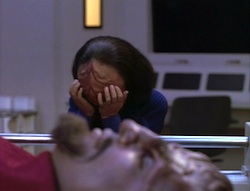
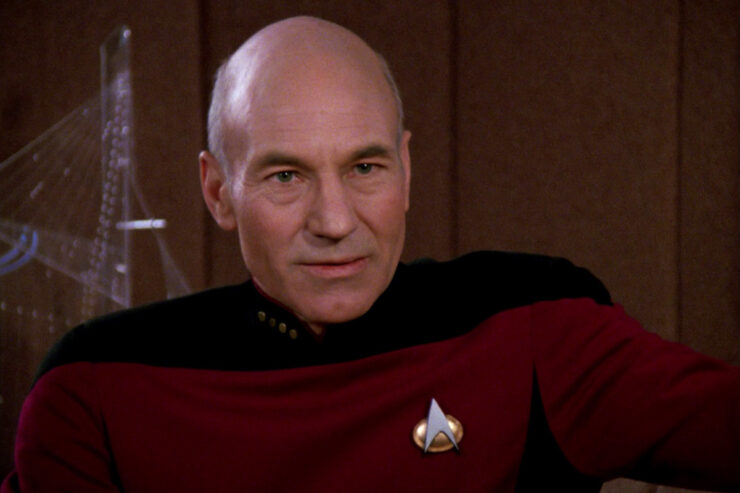
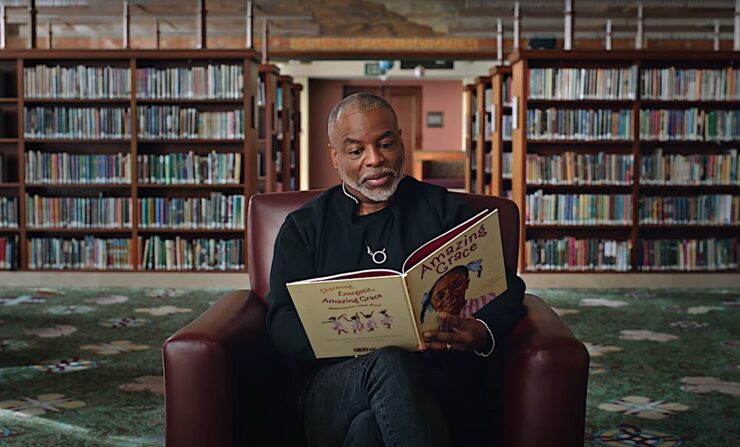
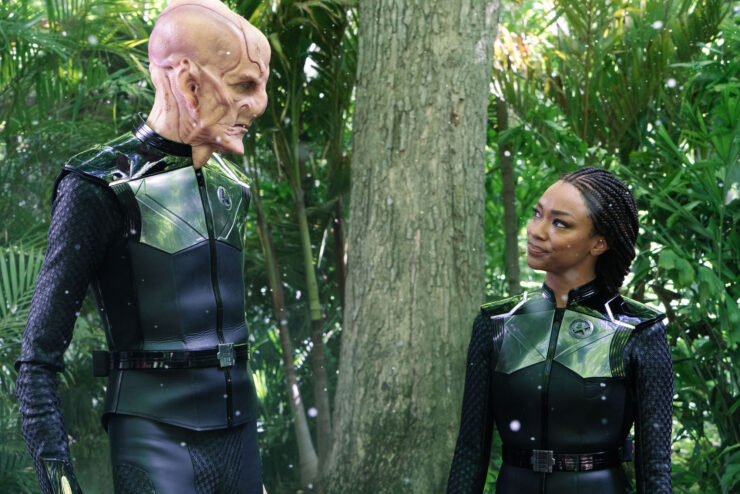
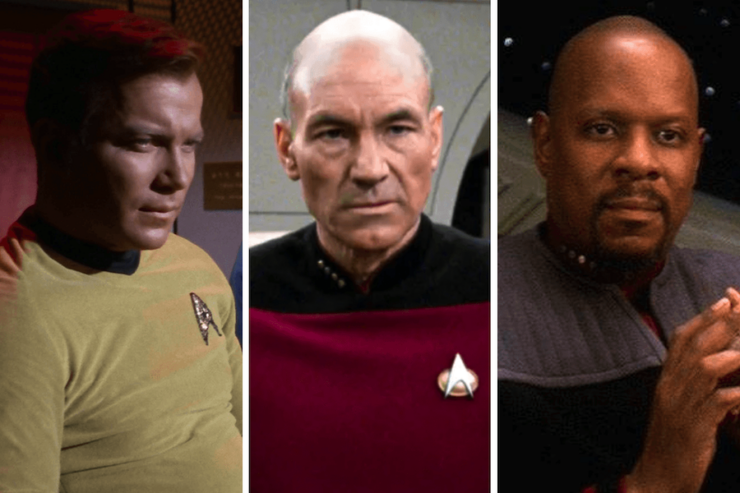
I know watching this, we were supposed to see Russell as being in the wrong (looking back now, she might as well have had a neon sign above her head flashing M-A-D-S-C-I-E-N-T-I-S-T), but I found Crusher’s final speech here as unconvincing as Picard’s in “The Masterpiece Society” for much the same reason. Crusher was absolutely right that Russell was reckless in general, but she’s ignoring the fact that Worf was going to commit suicide if he didn’t get full healing. If Russell is treating her patient as a thing rather than a person, so is Crusher: Worf isn’t a Klingon with firm, heart-felt convictions on the value of life with a disability, he’s just a crew member who was injured but whom Crusher is “sure” will adjust.
I respect Picard for wanting to respect Worf’s choices. I respect Riker for saying “Screw that!” and holding firm to his respect for life, cultural differences be damned. But Worf and both doctors all need some serious demerits for this one: Worf for being a coward, Russell for being reckless, and Crusher for refusing to understand or respect someone who’s supposed to be not only her patient but her friend.
What I thought interesting about this episode was how Pichard basically plays it like “Father knows best”. He sits in his office throughout most of the episode and plays the cool, rational guy while everyone else is wigging out about Worf’s decision to commit suicide. But I found this attitude to be inconsistent with his behavior in another episode (“Sins of the Father”?) where he was willing to dissolve the Federation’s alliance with the Klingons if they so much as harmed one hair on Worf’s head. What’s the difference? Either way, Worf would be dead. Why is he cool when it’s suicide, and apoplectic when it’s execution? Both decisions were Worf’s. Not that big a deal IMO, and I liked both episodes quite a bit. I pretty much like all Worf episodes.
Yeah, something of a ‘meh’ episode. Frakes’ best scene? – it’s certainly in the top three or so, but he gets (and pulls off) some very choice scenes indeed in ‘Frame Of Mind’… *dons tin hat, runs for cover*
I gotta disagree on this one. I think this is TNG at its finest. Keith, would you have enjoyed the episode more if it were named Ethics? with the question mark included? The plot holes for me were never the point – it was everyone except for Riker’s questionable ethics – Geordi, Crusher, Troi, Picard, Worf and Russell all either have questionable professional or personal ethics in this episode and the one character who examines his ethics in depth is the only adult who gets it right. Troi’s issues are completely out of bounds for a counselor and Picard’s are at a minimum hypocritical.
To me, the Dr. Russell character was really disappointing in that it seemed like yet another instance (“The Drumhead”, “Silicon Avatar”) of this show bringing in a character from the outside (and yes, a female one), establishing her as being brilliant – a leader in her field! – then tearing that all that down, exposing someone hysterical, disturbed, or just plain odious. Enterprise crewmember delivers sanctimonious speech. End of episode.
This could have been a real opportunity to craft a complex foil to Crusher. Instead of making Dr. Russell a one-note jerk, it would have been fun to see her as more of Dr. House type – someone undeniable jerky, but also charismatic, effective, and admirably no-bullshit. Let’s face it, with Worf’s cultural beliefs, the medical team was backed into a corner here. It was go big or go home (pardon the sports clichés – I’m overdosing on the Olympics).
I’m actually now quite interested to see how Russell is portrayed in A Time for War, a Time for Peace… Might be my next read!
as a life long wheelchair user I hate this plot with every fiber of my spastic being.
REWaters: the difference between this episode and “Sins of the Father” is that the events of “SotF” were predicated on a lie and political expediency. This episode, it’s mostly a personal choice on Worf’s part (though Riker himself pokes a hole in that theory with Worf).
—Keith R.A. DeCandido
Huh. So that’s TNG’s version of House, huh?
Only, y’know, less successful.
Lol, perhaps I just have a soft spot for mad scientists, but I actually found myself sympathizing with Dr. Russell’s frustration in this episode. :) I guess I’m alone!
Not to be rude here but how do you all like star trek?
I think its hilarious that every episode i love or at least can watch over and over is downright hated or casually “eh” by krad.
True maybe its because i was 7,8, and 9 when mom starting bringing home the vhs of TNG so i didnt base it off anything but is it believable and for an 8 yr old TNG was very believable.
Dont get me wrong here: i love this rewatch. Love finding new novels to buy and the back story with the writers and actors and plotlines yada yada yada
But mostly i love star trek because its star trek.
I didnt judge the acting or the script i just believe the Enterprise was awesome.
(though i too didnt really like La Forge the most. Loved him on reading rainbow though)
I think its funny that Krad does such a great job on his books, makes me believe these are the characters i love and yet doesnt like the episodes.
(and im sure that i have offended some person by these curious words and so please note that wasnt my intent. Blah blah blah)
What always ticked me off about this episode is that it introduced the deus ex machina of a plot device in the brak’lul but then it was never heard from again concerning virtually any other Klingon ever in the run of the tv franchise.
There are numerous times where such injuries occur in Star Trek that could totally be circumvented with a redundant set of organs or functions, but as far as any other Klingons-that-were-not-in-opening-credits are concerned, they’re just as mortal as anyone else. I mean, seriously, if you’re going to have an amazing piece of xenobiology save someone’s life, then I think it should apply to all members of that species, not just series regulars.
Other than that, the Russell/Crusher arc is “meh” (then again, I never really dug on many Crusher storylines), but the interaction between Worf and Riker is indeed superb. I think that argument involving Worf is only rivaled when Picard calls him a coward in Star Trek: First Contact.
@Seryddwr: No, I am in complete agreement with you on “Frame of Mind”. No one else seems to like that episode, but I love it so much that I took the Riker/Data scene from the beginning of that episode to theatre competitions and was very happy when I won a few of them. I’ll back you up 100%.
“No idea who Sandoval or Fang-Lee are….”
Really? I would’ve thought that by now you would’ve built a whole novel around them… ;)
This is a problematical episode, a mix of good points and weak points. For one thing, the opening is ridiculous — Worf gets paralyzed because a barrel comes loose and falls on him? By the 24th century they should have more sophisticated cargo bay designs than these silly things they had on TNG with barrels just sitting on shelves. Heck, they did have more sophisticated designs back in ST:TMP! (Along with seat restraints, security armor, and other sensible advances that have been forgotten by the TNG era.) The era’s tech should be too advanced for such a stupid accident. It would’ve been better to do something like the opening of “Tapestry,” where he’s beamed up from a planet and we learn he was critically injured in a battle or a rescue operation.
It was also a missed opportunity to give Geordi so little to do. How would he have reacted to Worf’s attitude that life with a physical disability is not worth living? Heck, they even set up the potential for such a thing by opening with a conversation that gave us one of the show’s rare reminders that, yes, that thing on Geordi’s face actually does something.
As for how Geordi could not peek… given what a wide field of view the VISOR gives him all at once, I think he would’ve had to train himself how to tighten his focus and ignore certain parts of the input so that he wouldn’t constantly be overwhelmed with optical noise. What we see, or what the rest of the crew saw in “Heart of Glory,” is the raw sensory input, but that’s not the same as what his brain perceives. It’s like how we can concentrate on just one voice in a crowd and tune out the rest, or how our brains will stop noticing a steady sound or smell or whatever if it goes long enough without changing.
The Riker scene was great, indeed. He was absolutely right. Screw cultural relativism — some cultural values are simply dysfunctional, and the Klingons are full of them. Sure, maybe there’s something worth respecting about a culture that doesn’t fear death, but the Klingons go out of their way to find excuses to die — and, worse, to kill — and that’s simply not healthy. (And honestly, I have trouble believing it’s possible for a space-age technological civilization to function with such medieval medicine, governmental organization, and combat tactics as the Klingons were shown to have in the 24th-century shows.)
Agreed on all points. This is the most contrived, predictable episode of TNG I can think of, and I remember cringing even when I saw the teaser because the whole thing is such an obvious mistake. Riker gets one great scene, but really, the whole episode should have taken a clearer stance that multiculturism is great and all, but some behavior is just dumb. Especially since it couldn’t convincingly be about Worf’s impending death.
I agree with CLB on a lot of his points. Geordi should have been in Worf’s face about overcoming disability and Riker was indeed a great scene telling Worf that he was talking out of both sides. I also agree with Chris that it makes sense that Geordi has figured out how to filter his input- after all it would make him completely useless in a combat situation when his entire vision would get whited out because someone fires a phaser. Also, there’s no sort of cargo bay tractor beam to make sure that barrels don’t just happen to fall over on passing crewmembers? Why don’t we see barrells rolling everywhere whenever there is a combat situation? Someone shoots the enterprise and the entire thing shakes, but somehow all the barrels just stay where they are until Worf walks past?
The problem with Dr. Russell to me was that we didn’t get a chance to establish her bona fides. Had she been a short-term, re-occurring character (I know, TNG didn’t have those) we could have gotten a couple of glimpses of her as a brilliant researcher who apparently has a few interesting interpretations of the Hippocratic oath. It could have been an epic scene where Crusher and Russell end up having a long drawn out argument over what is more important, the advance of medicine or a single patient? However, since Dr. Russell shows up, has an argument, and is never heard from again until KRAD needs an enemy for Doctor Crusher, we miss out on that.
I also think that the producers missed out on a great opportunity to further develop Worf by having him completely healed and recovered by the time The Outcast airs next week. Having him show some sort of residual weakness or new found understanding. Even when Nog loses his leg in season 7 of DS9, Worf doesn’t come to him and explain his own experience.
Yeah, another episode that brings up a major problem with having the Klingons have one world culture, fantatically devoted to WAR WAR WAR AND DEATH! …it just doesn’t add up. Wouldn’t a space age world nation of warriors actually be really, really GOOD at medicine? How else could they have survived, if so many strong warriors died in the prime of life?
WHY do they feel simple common sense and good health are dishonorable? Even the kookiest cultural views have a reason, deep down, for existing. They don’t exist just to contrast.
Another reason why I found DS9 (to some extent) breaking away from the classic ST alien formula to be rather refreshing.
krad: Good point. :)
@@@@@ Everyone: Why is Worf wrong?????????
It amazes me that a show about tolerance can show some of the most intolerance on issues like assisted suicide, which I can only assume, left-wing ST fans would be OK with.
Now I am not saying let’s go kill everyone in a wheelchair, but if someone doesn’t want to spend the rest of their life hobbling or rolling every where, shouldn’t that be their choice??
Everyone seems to be Anti-Klingon all of a sudden because they are not as afraid of death as us humans? I am OK with this. My grandmother, Grandfather, and Father have been in nursing homes at points in the recent past, and frankly, I think “Just letting people go” isn’t the cruelest most inhuman thing since Hitler. Maybe living to 147 plastered to a bed with 15 diseases and little consciousness ISN’T what everyone wants.
Back to the episode, I think it was well done and all the characters acted pretty much as they should…..
Crusher: all life is precious
Riker: Protecting freinds is #1.
Worf: KILL ME
Picard: Thoughtful
Troi: Retard, as always. At this point, she isn’t that hot anymore, we should put her to sleep!!!!
I give the episode a 7, I want to dislike it, but I can’t, well done.
@15,
Simple. have lots of Children. I think there have been numerous warrior human societies that solved their problems that way.
Geordi would’ve given Worf his insight into living with a handicap, but he was (almost certainly) busy offscreen being a holodeck creep.
You know, you mention every time how it’s obvious so-and-so isn’t going to die because they’re in the main cast, but after Lt. Yar and the way she died it seemed like pretty much anything could happen, and I wasn’t quite attentive enough to notice a missing name in the opening credits (most of the time I’m still not).
For a myriad of reasons it’s true that one hour episodic television is largely done differently than it was twenty years ago and that now, in fact, major characters could perish in any given episode of “Breaking Bad” or “The Walking Dead”. This was far from the norm in the days of “TNG” but I never understood the criticism that it stripped the teeth from any real dramatic impact of seeing our characters imperilled. Of course the main cast was going to survive whatever calamity befell them by the time Rick Berman’s name appeared on screen at the end of the show. The fun is watching HOW our heroes escape their doom. Is “Best of Both Worlds” any less exciting to watch because we know Picard won’t remain Locutus forever?
And I have to go with jlpsquared here… Worf isn’t “wrong” because he wants to die – he’s Klingon. I remember an interview with Michael Dorn way back in 1990 where he talked about the flack the character got for refusing to donate tissue to save the life of the dying Romulan in “The Enemy”. People compained it was unforgivably inhumane to which Dorn responded (paraphrasing here) “Of course it’s inhumane – Worf isn’t human! People tend to humanize everything – pets and sometimes even inanimate objects. I was glad the writers had the guts to keep Worf alien.”
I’d say that, yes, Worf is not only wrong to believe that it’s not worth living as a paraplegic, he is objectively wrong. There are plenty of paralyzed people out there who prove every day that it is possible to lead a worthwhile life without full mobility, and to accomplish as much as they could before they were “disabled.” And particularly with the kind of prosthetics that would be available in the 24th century, they should be able to do even better than a “normal” person could — just look at Geordi. Heck, look at that double-amputee runner in real life who’s stirring up controversy because his prosthetic limbs may give him an unfair advantage over “whole” athletes. We’re already there.
So it’s not a matter of opinion or preference we’re talking about, it’s a matter of simple fact. Worf believed a thing about the prospects for his life after paralysis which was just plain factually wrong and based in ignorance. And if someone is about to make a decision based on objectively wrong information, then hell yes, they should be informed that their assumptions are invalid. Because they’re not exercising their right to diversity, they’re just misinformed and on the verge of making a terrible mistake.
Except that there’s that little detail called the Prime Directive which won’t let us do that because we have to respect everyone’s cultural beliefs. If we tell Worf he’s wrong, we’re telling every Klingon they’re wrong and I think the shows and books show pretty well how well that goes over! lol
Gotta go with jlpsquared on this one, I don’t think it’s wrong that Worf wants to die. It’s a human notion that Worf’s life could still have value and meaning even with a disability, one that I, as a human myself, happen to agree with. But, Worf is not a human. His values are not the same. The fact that he is even wrestling with the decision is probably because he was raised by humans and some of that has worn off on him, but live as a paralyzed Klingon? No way.
That said, I do agree that Klingons have been painted into a caricature of themselves. There is no way they could be as technologically advanced and formidable if they didn’t even have advanced medical care. Krad’s Klingon Empire novels do a great job of addressing this, in my opinion.
@11, The Doctor in Voyager addresses the nature of Klingon physical redudancies, even though I don’t think he uses the exact term when discussing B’Ellana’s baby with her.
One last thing, I think it would have been cool if Dr. Russell had been Dr. Pulaski.
@Christopher Bennet,
I cannot disagree with you more if I tried. I think what you have is one of the most intolerant views I have ever read on a ST board. Because YOU believe something, it MUST be true, and anyone that doesn’t agree with just doesn’t get it.
I see where you are coming from, I really do. And you had one great point. You would think in the 24th century they would have better spinal procedures than they do today. But all that being said, if someone is paralyzed, I completely sympathize with their wanting suicide. I think back to the movie “Million Dollar Baby”, and completely agreeing with the choice the girl made. Now, if that happened to me? Who knows? I might decide to keep going at life. But than again, you have to factor in the constant medication, constant hospital visits, the pains, infections, etc… you will be constantly getting after a paralization. The mental and physical toll on your whole family. (I have had handicaps in my family, and YES, there is a toll). In many ways, I think the BRAVE thing to do is to just end it.
re: 22. Christopher L. Bennett, it wasn’t from ignorance or being misinformed though, they told him exactly what happened and what state he was in, exactly what was wrong with him, and exactly what they could do and what the results would be, and he wasn’t satisfied with it– if anything, he was somewhat misinformed when he agreed to the transgenic operation
24. Ginomo, I even remember there was a mention of a vestigial third lung that I don’t think was evident up through TNG
One thing bothers me. It’s about when Worf asked Deanna to take care of Alexander if anything happened to him due to his foster parents being up in age. Why her, and not his brother Kurn?
As I watched this episode, I couldn’t help but think that this was “Star Trek does M*A*S*H” (the TV series). In that regard, they did the right thing in modeling Dr. Russell after Charles Winchester (“Half a Life”‘s David Ogden Stiers) rather than Frank Burns. Maj. Winchester was a jerk but an excellent surgeon, as is Russell. But what made Maj. Winchester such a remarkable character, and what made the show so powerful after he joined, was that his facade was just that — deep down he really did care about his patients and saw medicine as a way of actually helping people on an individual level. The problem is that Dr. Russell sees medicine as a was of helping humanity in general without regard to the individual, which makes her unlikable, turning her into a stock character that simply triggers Crusher’s moral speeches.
I do wonder, though, if we expect too much from Star Trek: TNG as we look at it from our current cynical time. This episode was made when the top 10 TV shows included “Murder She Wrote”, “Full House”, and “Major Dad”. As a product of its time, attempting to view human weaknesses through a positive lens, I’m not sure how we could really expect much more from this episode than we got. I guess that means the show doesn’t hold up so well, but I think perhaps that says more about us than it says about TNG.
I remember the first time I watched this episode, I was so fired up by some of the issues it raised, I described the entire thing to my Mum just so we could discus it. I agree with some of the criticism about Russell but I still think this is a great episode to argue about. And I always adored the way Riker turned tables on Worf.
I absolutely agree with jplsquared and Yakko. It’s not a matter of cultural differences when it comes to Worf, he is a different SPECIES. So a human’s argument about Worf’s way of thinking being wrong or dumb or whatever is as valid as a Klingon’s argument about humans being sissies. The bottom line is, it’s his choice to live like that or die. Crusher’s (or any other human’s for that matter) ethics have nothing to do with it, it’s not her choice to make.
Why didn’t they just transport Worf, the saved pattern buffer of his 100% okay body could have being used to just rematerialise him whole again…..
@Yakko– agree 100% with both your points. Maybe I just have a greater ability to suspend my disbelief and let myself believe for a second that Worf really is dead, Crusher really is devastated, and Troi really feels it when she sees Crusher’s face and says “no…” I think this story was fantastically well told, and I’m sure that Dr. Frankenwhatsherface did lots of stuff off camera that made her less evil. These are the holes my imagination fills in, and I think there’s enough here for me to do it.
On Klingon vs Human beliefs- this is very well played. I can see how someone who uses a wheelchair would feel slightly betrayed by this episode- especially given the tendency for Trek to be viewed as “aliens are allegory for X humans,” but in the end this allegory is not using the story to say “people with disabilities should kill themselves,” it’s saying “people should respect that fundamental beliefs are different between cultures, and you should respect that by not imposing your moral system on them.”
Quick thoughts:
– If I were Troi, I would be like WTF you’re asking me to suddenly become a parent?!? This only goes away when I convince myself that there was more Worf/Deanna/Alexander development off-screen.
– OMG I wish that they had used Pulaski. I would have loved to see Gates McFadden take her down a peg :P
I think Crusher comes off rather badly in this one. Not only because she ignores her patient’s wishes, but also because her anger at Russell looks ridiculous. The episode leaves no doubt that she would have liked to bring charges of malpractice against Russell – but she doesn’t do anything except yell at her a bit. Why? It looks to me that Russell’s actions with the patient in the cargo bay were probably justified after all.
KRAD, Sisko took such a hard line with Worf in Sons of Mogh because he really did try to kill Kurn. But Worf was asking Riker to bring him the knife so he could end his own life with it. That’s why Picard took a different attitude in Ethics.
Of course, the actual reason they shouldn’t let Worf kill himself at that particular moment in time is that he’s still in a state of shock, stress, pain and sorrow (assuming Klingon psychology works anything like ours, which I haven’t seen evidence it doesn’t) and that’s not a sound state of mind to make that kind of decision. Of course, one’s he’s capable of thinking of it rationally instead of emotionally, if he still wants to kill himself, I would hand him the knife myself.
No one wants to bring up Dr. Russell’s resemblance to Hillary Clinton?
I think Sisko took a harder line in DS9 because he wasn’t the Arbiter of Succession for the Klingon Empire and wasn’t thoroughly steeped and inculcated in Klingon culture and tradition. Until it was necessary for the safety of the Alpha Quadrant near the end, he didn’t seem to care about Klingon tradition and politics as much as that Worf was a Starfleet officer regardless of his species and that adherence to Starfleet principles were more important than honoring cultural heritage. Partly I think that was because the writers on DS9 did a better job of integrating Worf as a Starfleet officer, whereas Gene Roddenberry’s influence on TNG was that Worf was an alien and he was culturally different than “us” and so could get away with things. It’s like how Adm. Ross in “Tears of the Prophets,” tells Sisko he was a Starfleet captain or the Emissary; he couldn’t be both. On the one hand, TNG tried to say, Worf’s a Klingon who happens to be in Starfleet; Picard even brought up his using the Federation records on the Khitomer Massacre as a “Compromise of our most fundamental principles,” when it was clear by the writing otherwise, that Worf was an exception who could skirt between Starfleet and Klingon values when he chose to. That always bothered me about TNG; Worf, a Starfleet officer, in a Starfleet uniform, killed Duras, one of the challengers to the leadership of the Klingon Empire, which is a direct violation of the Prime Directive and he was all but applauded for it. It would be the equivalent, in my view, if hypothetically a U.S. Navy lieutenant of Hispanic descent, on a ship visiting a port in Spain, killed one of two candidates to be Spanish Prime Minister and then was allowed to go on his merry way on the ship. In reality, they would be almost certainly handed over to the Spanish courts, after being court-martialed and thrown out of the service. I know the Klingons “Consider the matter closed,” as Picard put it but the Federation should have charged Worf with directly violating the Prime Directive and thrown him in prison for the rest of his life after discharging him dishonorably from Starfleet. It is even more complicated that Worf’s family was a powerful and influential House steeped in Klingon politics; he should have been put off the ship at the nearest starbase as soon as the matter began, as he had more conflicts of interest than the U.S. President. I’m glad Sisko’s attitude was “You’re a Starfleet officer, NOT a Klingon warrior. I don’t care what Klingon nonsense (as K’Ehleyr put it so eloquently) you think you’re involved with, f**k up like that again and I’ll have your head on a platter.”
My problem with this one is that medicine is a lot of times about taking risk and not playing it safe. A lot of the medical advances we have today are not from careful research but from people improvising to get the job done. If there’s a willing patient who knows and is capable of accepting the risks, then by all means, experiment away.
Nobody has mentioned the fact that it would be wrong for Geordi to “peek” at the cards, even “after the hand is over.” In poker, you don’t have the right to see cards you didn’t pay for. If an opponent folds their hand, nobody has the right to see it, even after the hand is over. And if someone bluffs everyone else out of the hand, the bluffer is allowed to show their cards if they choose, but they also have the right to muck their cards without showing. Peeking at them in that circumstance, whether by physically picking them up and looking, or by seeing through them with a visor, is cheating. Poker is a game of information, and you have to PAY for that information. I once offered to break a guy’s arm because he kept peeking at the muck after he was out of the hand. Everyone at the table backed me up.
A Poker Player: yes, though in a friendly game where no real money is exchanged, those rules can be a bit more lax.
—Keith R.A. DeCandido
True, that’s often the case in “friendly” games, although I still don’t like it. That rule is there to keep the game valid. It’s like playing chess, but being allowed to “take back” a bad move.
But the “friendly game” explanation brings up another question: If they don’t use money in the 24th century, what’s the value of those chips they’re using? How do they determine how many chips each player starts with?
@42- I’ve asked that question as well. A casino card game is a strange pastime for the gang on the Enterprise to get into, as what makes casino games interesting is the risk, and what makes poker so compelling in particular is the bluffing. Bluffing to win colored chips is kinda lame… IMO
In review, I also note two more points:
1: This episode is called “Ethics,” and it’s the ethics of Geordi “stealing” information at the poker table that I’ve called into question. Was that intentional on the writers’ part?
2: There is no actual poker shown in this episode!
1. TVMDave: totally! Russell looks startlingly like Hillary Clinton!
2. What I was surprised that no one brought up in the comments was that Jonathan Frakes clearly had a cold for the taping of this incident. Maybe it’s more obvious in 2020 listening on headphones to a high quality feed. But he’s got a head cold for sure!
Agree with @40. You pay to see the cards. If you don’t pay you don’t get to see them. Whether the game is friendly or not is irrelevant. Because if you know the type of hands your playing partners are bluffing with, you gain a significant advantage over all the other players for future hands. It’s cheating.
I’m astonished that so many thoughtful people here would label Worf’s desire to commit assisted suicide as definitively “wrong”. For me, the only thing more sacrosanct than the right to life is the right to choose one’s own path. And considering so much of Trek is about recognizing and even celebrating the differences among species, cultures, life-forms, Etc, What is so wrong with an absolutism that allows for self-determination about the most fundamental freedom? If one has a right to live, then the opposite must be true. Otherwise it’s not a right, it’s conditional on you making a choice consistent with conventional mores.
@23/leandar: “Except that there’s that little detail called the Prime Directive which won’t let us do that because we have to respect everyone’s cultural beliefs.”
The Prime Directive prohibits forcing others to do things your way. It doesn’t prohibit debating with them and offering them a different perspective. The Federation does that all the time, e.g. trying to convince two warring planets to make peace with each other.
@42/A Poker Player: “But the “friendly game” explanation brings up another question: If they don’t use money in the 24th century, what’s the value of those chips they’re using? How do they determine how many chips each player starts with?”
How do they determine the value of Monopoly money or Scrabble tiles? It’s all just arbitrary numbers to define who’s performing better at the game. It shouldn’t be hard to define some initial quantity of chips that every player is given at the start.
@43/fullyfunctional: “Bluffing to win colored chips is kinda lame… IMO”
Whereas I feel that playing for actual money would take the fun out of a game and make it feel too much like work. If the appeal of poker is the psychological strategy and competition to outsmart or outread other players, then the money seems secondary to that. I mean, chess is a battle of wits, a competition to read each other’s strategies and avoid falling for each other’s feints, and it doesn’t need money at stake.
@46/fullyfunctional: It’s not about denying Worf the choice, it’s about disagreeing with his reasons for making it. Many years ago, my local newspaper carried a regular column from a disability activist who argued strongly against the idea of assisted suicide in response to disability on the grounds that it was a dismissal of the humanity and worth of disabled people. She argued that saying “It’s right for people to choose to die rather than be disabled” is tantamount to saying that people with disabilities would be better off dead, and it’s a short hop from there to believing it would be merciful to euthanize them. Historically, genocides often begin with the disabled, using “mercy” as the excuse. So just imagine how it would feel to her, or any other member of the disabled community, to see someone saying “I’d rather be dead than live a life like yours.”
And as I said years ago, it’s an attitude based in ignorance and xenophobia. It’s blindly assuming that you can’t lead a satisfying life with a disability, when countless people can and do. It’s a prejudiced belief, a willful refusal to learn the truth about a category of people different from oneself.
So you have it backward. Worf is the one who’s condemning the differences between people rather than celebrating them. He’s saying that he’d rather die than live a different life than the one he’s familiar with, and that is the ultimate in xenophobia.
I’ve always disliked this episode, but thanks to Lower Decks, I can’t even watch it now without hearing Ensign Tendi’s singsong, “Let’s send you to Sto-Vo-Kor!”
I agree with the comments to the effect that an opportunity was blown by not having Geordi tell Worf to take his Klingon ableism and stuff it. I felt that way about “The Loss” in season 4 as well.
Given the gravity of the topic and heated/emotional tone of the responses, continuing to moderate this conversation to anyone’s satisfaction is becoming somewhat futile. We appreciate the attempts to be civil, but it’s time to close comments and move on. Thanks.